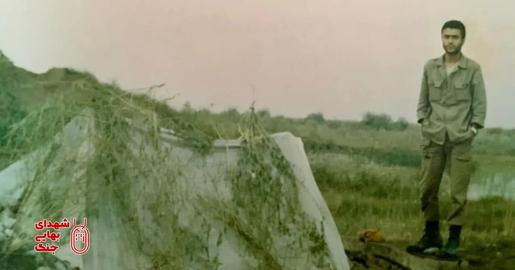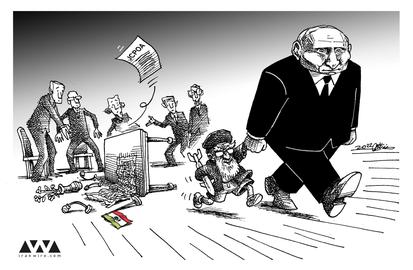During the Iran-Iraq war, from 1980 to 1988, thousands of Baha'is went to the front alongside their compatriots. Dozens of them were killed, wounded or captured. The Islamic Republic is reluctant to name them alongside other victims of the conflict – the ones were were killed are officially termed “martyrs” of the war.
A continuing series of IranWire articles looks at the Baha’is who died as a part of this conflict. If you know any Baha’is who were killed during the Iran-Iraq war, and have a first-hand account of their lives, please contact us.
Soheil Rouhani was born in 1959 to a Baha’i family in Tehran. His father, Badiollah Rouhani, was an Iranian army officer who was assigned to the army’s aviation base in Isfahan. He retired one year before the 1979 Islamic Revolution in Iran. After the Revolution, followers of the anti-Baha’i Hojjatieh Society seized the opportunity to harass Baha’is through institutions and committees created by the revolutionaries; shortly thereafter, when the Islamic regime was firmly established, persecution of the Baha’is became legal and official.
Soheil’s father was a well-known Baha’i in Isfahan; he had also been an army officer, so he became a special target of harassment, so much so that the Rouhani family was forced to move to Noshahr in the northern province of Mazandaran where Soheil’s uncles lived.
Soheil Rouhani’s Education
Soheil attended primary and secondary schools in Isfahan. He loved to paint but he was also an expert photographer. After receiving his high school diploma – and before the Revolution – he went to Tehran and enrolled in Television and Cinema College. Soheil continued studying until about two years after the Revolution: he did not move to Noshahr with his family and remained in Tehran until his military service started.
Military Service
On September 22, 1980, war came when Iraq, under Saddam Hussein, launched a full-scale invasion of Iran. It was a surprise attack and, shortly after the war began, Iraq succeeded in occupying parts of southwestern Iran, including the important port city of Khorramshahr. A wave of patriotism swept over young Iranians and Soheil, like many of them, was eager to defend his country. He had just graduated from college and had an opportunity to go to Turkey. He chose instead to register for military service. “If all young people leave Iran, then who would defend our families, our mothers and our sisters?” he told his family.
Soheil’s father had served in the military for 30 years and had a good understanding of the hardships and dangers of military life and war. He explained these to his son; but Soheil was determined to join the army, to defend his country as an Iranian.
Soheil Rouhani started his military service in early 1981 and, after completing his training in Tehran, was sent as a sergeant to the southern front in Khuzestani cities of Abadan and Ahvaz. He served in this area until he was killed.
Martyrdom of Soheil Rouhani
At 5am on December 24, 1982, after serving 23 months in the military, and when he had only a month to go until discharge, Soheil lost his life due to an accident while driving a jeep transport. According to a fellow soldier, the accident was so severe that he was thrown out of the vehicle, hit his head on a rock on the roadside and suffered an intracranial hemorrhage. A few minutes later Soheil died in the arms of his friend. He was 23.
“Friend of the People”
Soheil could be called a “friend of the people”. When he saw a person on the street who had difficulty moving a heavy load, he would help that person to carry the load to his destination. On the front, some soldiers who were digging trenches abandoned their tasks; not Soheil. He said that “Trenches save our own lives. They run away from digging trenches because they do not know this. But I know and I go on digging the ground.”
Soheil was also a “lover of family”: he was the younger brother but they all trusted him and sought his advice. To spare his parents discomfort and worry, he seldom told them about the situation on the frontlines in his letters or when he was on leave.
Perhaps the only time that he did speak about the front was when he told his family that, one night, the head of his comrade-in-arms was hit with a mortar when he peeked over the rim of the trench; the lifeless body, with its shattered head, fell into his arms. Soheil said that for some time he could not get rid of the smell and the color of the blood off his hands, no matter how many times he washed them.
Difficult Days
Soheil’s aunt and his brothers in Tehran were the first to be told about his martyrdom. They found a cover story to bring Soheil’s parent to Tehran to tell them the news. Those were difficult days for his parents. They were expecting to see their son, who was due home for his last leave of absence before his discharge from military service. His mother had purchased fish to cook for Soheil on the day he was to arrive. She knew that Soheil was fond of fish from the Caspian Sea.
Soheil’s Burial
After Soheil’s brother and cousin identified his body, Iranian security agents wanted to bury him in the martyrs’ area in Behesht Zahra, Tehran’s main cemetery, but the family did not agree. They said that Soheil was a Baha’i and he must be buried in a Baha’i cemetery according to Baha’i rites.
The body was turned over to the family but, at the time, the Baha’i cemetery, Golestan Javid, was confiscated by the government; so they performed funeral, and prayers, at Soheil’s aunt’s home. After the confiscation of the Baha’i cemetery, the government had set aside a plot next to the mass graves of political prisoners in Tehran’s Khavaran neighborhood for the Baha’is to bury their dead.
Soheil Rouhani was buried in that plot. At that time, only five or six people were allowed to participate in the burial ceremony for a Baha’i so, except Soheil’s parents, only two or three relatives attended the burial.
Denied Martyrdom After Death
The Martyrs and Veterans Affairs Foundation refuses to recognize Baha’is as war martyrs – including Soheil. As a result, his family has never enjoyed the benefits awarded to the families of slain veterans.
The interesting thing is that, two years after Soheil was killed ,a plate, signed by the then-President Ali Khamenei did name and celebrate him as a martyr. So even though the army accepted Soheil Rouhani as a martyr, the Martyr Foundation itself continues to refuse to recognize him as such.
A few months after Soheil was killed, his father Badiollah Rouhani was summoned to Isfahan’s Revolutionary Court. When Soheil’s mother went to the courthouse she learned that the court had issued a verdict, demanding that Badiollah Rouhani must reimburse his 30 years of salary because he was a Baha’i and the Islamic Republic did not allow Baha’is to serve in the military.
While she was in the courthouse, somebody confidentially told Mrs. Rouhani that her husband should leave Iran as soon as possible because they wanted to arrest him on some pretext or other. This forced Badiollah Rouhani to smuggle himself out of Iran and he was joined later by his wife and his daughter.
Thus, the Islamic Republic not only refused to recognize the martyrdom of Soheil for his country, it even denied his parents any chance to mourn their young son by sitting next to his grave.
Related Coverage:
Yousef Moghaddam: A Baha'i Stripped of His Rank as a Martyr of War
Farhang Shah Bahrami: An Iranian Baha'i Martyr of War
Mehrdad Badkoobeh: An Iranian Baha'i Martyr of War
Saeed Masoudian: An Iranian Baha’i Martyr of War
Gholamreza Alaei: an Iranian Baha'i Martyr of War
Behrooz Mehregani: An Iranian Baha’i Martyr of War
Farhad Zahedi: A Baha'i Martyr of the Iran-Iraq War
He was not Deemed a Martyr Because He was a Baha'i
30 Years After The Iran-Iraq War Baha’is Sacrifices Still Not Recognized
visit the accountability section
In this section of Iran Wire, you can contact the officials and launch your campaign for various problems




























comments